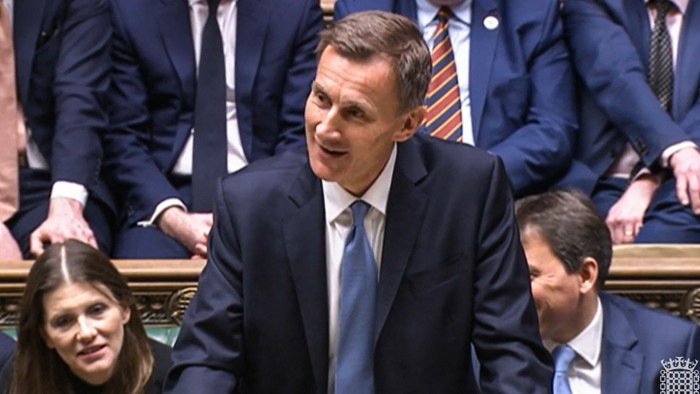Budget 2023: Jeremy Hunt makes childcare the new battleground in politics


Roula Khalaf, Editor of the FT, selects her favourite stories in this weekly newsletter.
This article is an on-site version of our Inside Politics newsletter. Sign up here to get the newsletter sent straight to your inbox every weekday
Good afternoon. Jeremy Hunt has just delivered his first Budget. We’ll have much, much more on the policies contained within it elsewhere in the FT and in tomorrow’s note. You can follow the latest reaction to the speech on our live blog but for now, some thoughts from me on the big picture politics: Hunt’s ambitious childcare pledge and his attempt to get the UK’s growth back on track.
This special edition of Inside Politics is edited by Gordon Smith. Follow Stephen on Twitter @stephenkb and please send gossip, thoughts and feedback to insidepolitics@ft.com
The kids are alright
The biggest — and in my view, one of the best — things that Jeremy Hunt did in his speech was to extend the 30 hours’ free childcare to children aged nine months and over. That ends the bizarre quirk in UK childcare policy, where state support vanishes at the end of the shared parental leave period and doesn’t reappear again until the age of three (infants, apparently, don’t require food, shelter or care).
These changes won’t come into full effect until September 2025, but the major political change is that Hunt has completed the gradual expansion of a new bit of state responsibility: providing so-called wraparound childcare to all children after they are nine months old. There’s much to criticise about the “30 free hours” model, not least that the state provides less in subsidy than it costs providers to put on, which is one reason why the costs outside of those 30 hours are so high, whether for parents who work longer hours, or in the form of additional costs for lunch or other services.
But zoom out and what really matters is that by 2025 the British state will be in the business of providing or subsidising some form of childcare from zero to the age of 18. That is a permanent change in British politics that isn’t going anywhere.
One lesson of the 2010-17 period is that democracies very rarely stop providing public services once they start. They might subject them to sharp cuts that severely limit their effectiveness — just ask anyone who’s had their bike stolen or come into contact with the NHS lately — but they don’t actually stop providing them.
For the moment, that is a headache for Labour, which wanted to make childcare one of its big dividing lines going into the next election. Although there are plenty of important technical debates about how exactly Hunt’s pledge will be fulfilled, the next election will be to wraparound childcare what the 1945 election was to free-at-the-point-of-use healthcare, when both parties went into the election promising to provide it (It may be some comfort to Labour that it won that one, of course).
In the long term, the headache will be for future chancellors of the exchequer, who will not easily be able to free themselves of this new responsibility.
Keir, and sandwiches
One reason for Jeremy Hunt’s big focus on childcare is nakedly political: the “sandwich generation” — that is, anyone with parents over 65 and children under 18 — are the big political battleground in most democracies, for obvious reasons. As one Conservative strategist recently put it to me:
Basically, politics is about who you [government] can reach out and touch. Working-age people with good jobs and no kids, basically, they just want you to tackle crime and potholes. But it’s people who are looking after their kids, or their parents or grandparents, who really notice healthcare, schools, whether the childcare’s crap, and they’re the people you can reach out and touch, and that’s why they are going to be the focus.
His childcare pledge is a big offer to one of the groups you can “reach out and touch” with the levers of government policy. But it is also of course, a big part of the other thing this Budget is trying to do, which is to increase UK growth and to get more people into work. Hunt did a lot of sensible stuff on this, from allowing businesses to immediately deduct the cost of investment for the next three years to changes to pension entitlements.
Of course, good growth is one of the things that most people do notice — even those of us who are not in a group that government can easily “reach out and touch”. And good growth means the difficult choices that Hunt has to make on tax and spend all get easier, and mean that some of the promises he is making on the never-never (like increasing defence spending when circumstances allow) will be deliverable.
He has continued the Darlingesque measures from his last fiscal event in many ways: measures to protect households from the continuing energy price shock in the short term, and then some very, very sharp and painful spending cuts due to come after the next election. Unless, of course, his measures to get growth going mean he has more room for manoeuvre than we currently expect.
In some ways this is a “heads you lose, tails I win” bet for Hunt. If what he does succeeds in getting growth up and generating a feelgood factor this side of the election, the Conservatives will be re-elected. If it doesn’t work, then it will be Keir Starmer and Rachel Reeves’s problem.
Now try this
Good to see some support for the UK’s video games industry in the Budget: the beneficiary of what was at the time a world-leading tax relief by George Osborne but an increasingly neglected industry in recent years (the UK’s is the third-largest, behind only the US and Japan).
Anyway, one excellent recent British video game that is worth your time is Citizen Sleeper, which runs on essentially anything. Our games critic Tom Faber lists it among his best of 2022.
Top stories today
‘Budget for growth’ | The chancellor put £9bn of business tax breaks at the heart of his statement.
What does the Budget mean for your money? FT reporters explain.
Easing pension tension | Consumer Editor Claer Barrett explains what the relaxation of tax limits means for your pension.
Comments